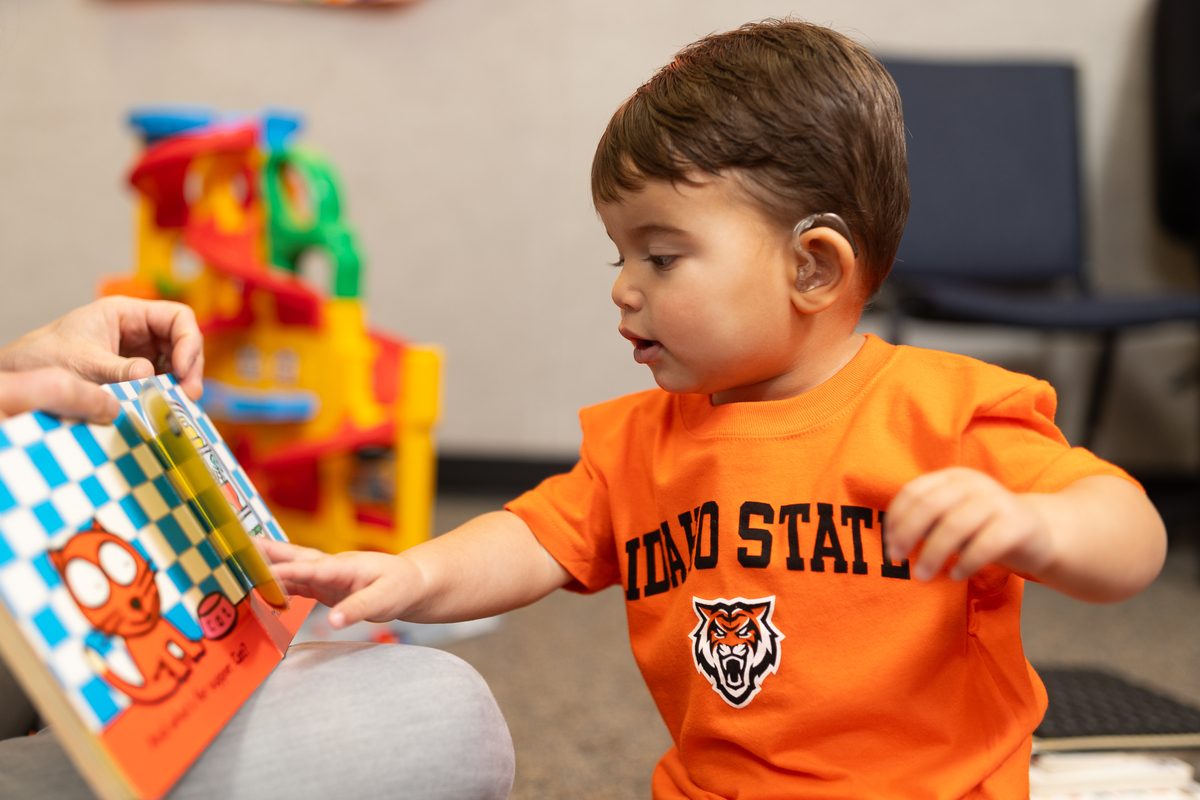Scholarships and stipends will help train providers to serve young children who are Deaf and Hard-of-Hearing in early intervention
December 20, 2023

Funding for the Idaho Hearing Education and Aural Rehabilitation (IHEAR) program will train, provide tuition and financial support to 42 scholars.
Idaho State University’s Department of Communication Sciences and Disorders (CSD) was recently awarded two grants from the Office of Special Education Personnel Preparation totaling $2.2 million over the next five years. With the funds, the Idaho Hearing Education and Aural Rehabilitation (IHEAR) program will train, provide tuition and financial support (stipends) to 42 scholars who will be related service providers (in speech-language pathology and audiology) and educators focused on serving children who are Deaf or Hard-of-Hearing (DHH) and their families in early intervention.
The grant recipient and principal investigator for the IHEAR program, Dr. Kristina Blaiser, professor for Idaho State, is familiar with the needs of families of young children who are DHH. Not only has Blaiser directed two schools for children who are DHH in the past; she currently directs the Helping Adults Talk to Children with Hearing Loss (HATCH) Family-to-Family Support program for the state of Idaho. The HATCH Lab Family Ambassadors, Kat Ross and Lesa Coleman, both mothers of children who are DHH, reach out to families of infants who have recently been identified with hearing loss across the state.
There are approximately 100 families who are engaged with family-to-family support through the HATCH lab’s ongoing services and support, with weekly Zoom calls and newsletters, and the annual Family Support Conference.
Blaiser noted, “The model we have running family-to-family support through a university is unique in the country and comes with benefits that are particularly helpful in a rural state like Idaho. The integration of technology helps bring families together, regardless of their geographic locations. Instead of feeling isolated with a low incidence diagnosis, families feel connected and empowered.”
Blaiser says another unique advantage of this model is that families and professionals work together to help connect families with support and resources.
The IHEAR Program comes, in part, in response to the needs of the families that have been seen throughout the state. While Idaho has a strong Deaf Mentor and American Sign Language (ASL)-Based Deaf Education program, there is an ongoing shortage of speech-language pathologists, pediatric and educational audiologists, and early intervention personnel with specialization in listening and spoken language.
“As a parent of a child who is Hard-of-Hearing, I can attest that there is a significant need for this type of training program, says Shelly Estevez. “When we first learned that our son was born with hearing loss, we instantly began to search the Internet on what this meant and what sorts of things we could expect for our son as he grew up. We also wanted to know, ‘what do we do now? How do we make sure he gets the language that he needs? Do we need to learn sign language?”
Estevez adds, “We were told that we should start getting him language services. I called multiple speech language therapists in Pocatello, but most had no experience working with infants or toddlers who were deaf or hard of hearing. Those that did have such experience usually worked with preschool-aged children. It felt like a black hole of service providers to find someone who had any experience that would be useful to meet the needs of our son.”
Blaiser says that over the last 20 years, the language possibilities have changed considerably for children who are DHH. With newborn hearing screening and advances in hearing technology, it is possible for children who are DHH to learn to communicate using spoken language. However, to optimize these outcomes, it is important to have providers who understand how to use and integrate the hearing technology into spoken language.
The IHEAR Program will be the first of it’s kind funded by the Office of Special Education Programs at Idaho State and is lead by an interprofessional team of faculty members and students: Drs Kristina Blaiser, Gabe Bargen, Chris Sanford, and Jenn Gallup, along with students working toward a PhD, Blair Richlin and Ashley Ben-Jacob. This team approach, combined with the ongoing connection with the HATCH lab family support program, will help ensure tomorrow’s providers are well-versed in family-centered practice as they enter the profession.
The first cohort of IHEAR students will be accepted in Fall 2024. Please contact KristinaBlaiser@isu.edu for more information.
Categories:
